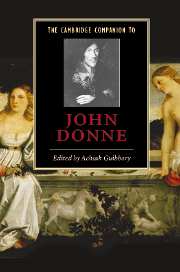Book contents
- Frontmatter
- 1 Donne’s life: a sketch
- 2 The text of Donne’s writings
- 3 The social context and nature of Donne’s writing: occasional verse and letters
- 4 Literary contexts: predecessors and contemporaries
- 5 Donne’s religious world
- 6 Donne’s political world
- 7 Reading and rereading Donne’s poetry
- 8 Satirical writing: Donne in shadows
- 9 Erotic poetry
- 10 Devotional writing
- 11 Donne as preacher
- 12 Donne’s language: the conditions of communication
- 13 Gender matters: the women in Donne’s poems
- 14 Facing death
- 15 Donne’s afterlife
- 16 Feeling thought: Donne and the embodied mind
- Select bibliography
- Index
- Series List
6 - Donne’s political world
Published online by Cambridge University Press: 28 November 2006
- Frontmatter
- 1 Donne’s life: a sketch
- 2 The text of Donne’s writings
- 3 The social context and nature of Donne’s writing: occasional verse and letters
- 4 Literary contexts: predecessors and contemporaries
- 5 Donne’s religious world
- 6 Donne’s political world
- 7 Reading and rereading Donne’s poetry
- 8 Satirical writing: Donne in shadows
- 9 Erotic poetry
- 10 Devotional writing
- 11 Donne as preacher
- 12 Donne’s language: the conditions of communication
- 13 Gender matters: the women in Donne’s poems
- 14 Facing death
- 15 Donne’s afterlife
- 16 Feeling thought: Donne and the embodied mind
- Select bibliography
- Index
- Series List
Summary
Scholars have disagreed over Donne's political attitudes for some years now, some representing him as a committed (or just a cynical) monarchist, others as an early modern liberal, subtly critical of the claims to ''absolute'' power made by the Stuart kings. The first group cite explicit absolutist statements and the implications of monarchic figures in his poetry. They emphasize his apparent ambition and his cultivation of powerful courtiers. Some make this case with regret for what they judge to be Donne's opportunism; others see him as coerced by the dominant discourse of power. Those who qualify this view read the monarchic imagery of the love poems not as endorsing absolutism but as asserting the lovers' autonomy. Against his explicit endorsements of monarchic rule they set the levelling implications of his emphasis on a common humanity, and on mankind's equality before God, discovering between the lines of his later work a continuation of the disparagement of monarchy found in the Satires. They note Donne remained on good terms with ''oppositionist'' friends, and was not the only person in England who changed his religious allegiance in the second half of the sixteenth century: so did many thousands of others. They infer a lack of ambition from his impolitic marriage, and from hints that he was subsequently reluctant to re-enter the political world.
- Type
- Chapter
- Information
- The Cambridge Companion to John Donne , pp. 83 - 100Publisher: Cambridge University PressPrint publication year: 2006



